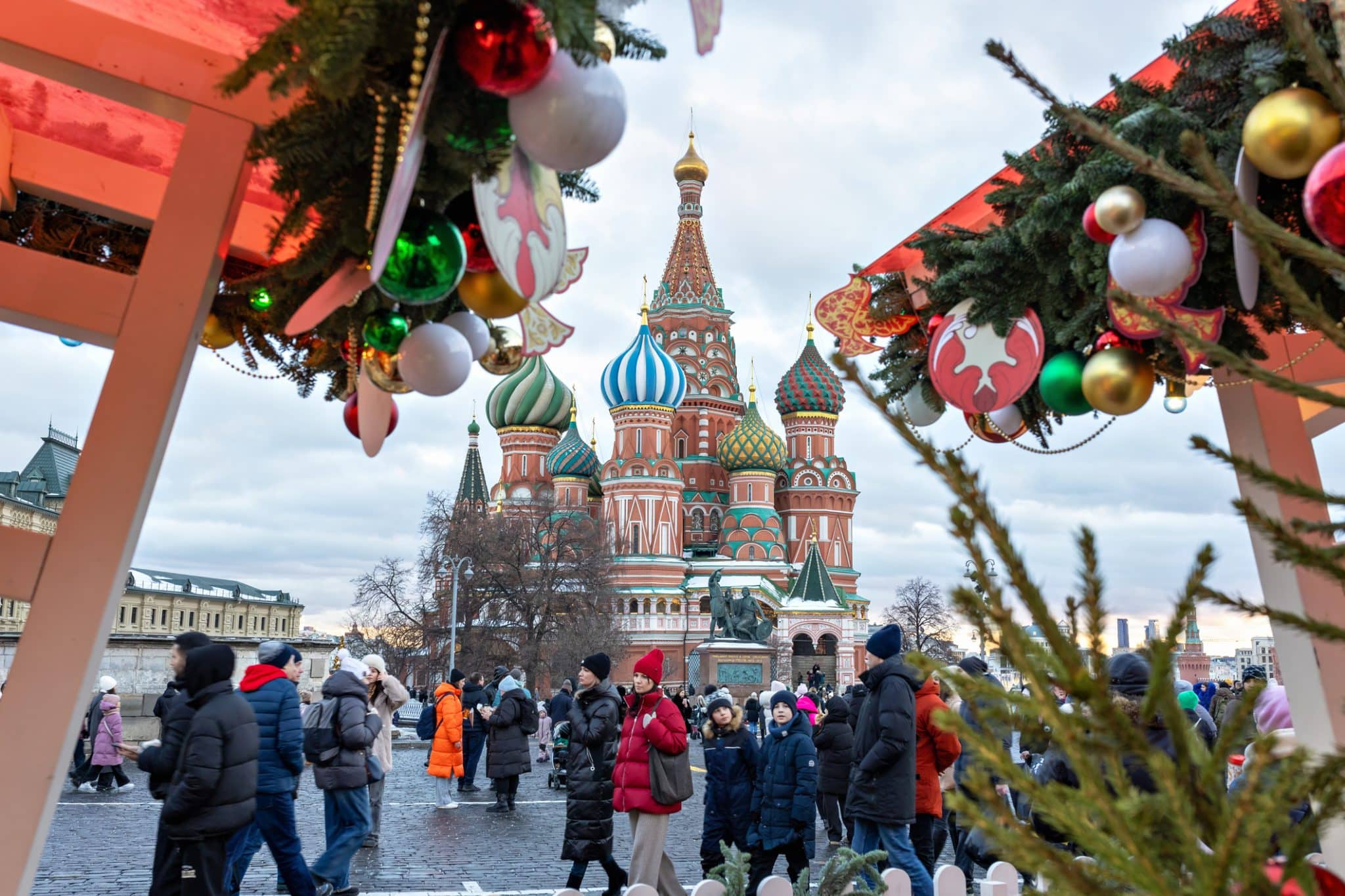Russians have typically gotten nearly three weeks off a year just for holidays. This has changed in recent years and especially since the start of the war in Ukraine, as Russia has pushed for greater effeciency in its economy. While the long New Year holidays remain, most others are now more modest, with often with single day off for each. Russia is also making liberal use of “working Saturdays” – which occasionally trade an extra day off at the start of the week for an extra working day on the preceeding Saturday. This now limits the amount of holiday time to about two weeks.
Wider Russian holiday traditions include religious and pagan as well as the patriotic and more. Find out more about Russian holidays, their history, cultural significance, and related days off below.
Days Off
Long Weekends and Extra Days Off by Semester for 2026
| Spring | Summer | Fall | Winter |
| March 9 May 1, 11 |
June 12 | November 4 | January 1-9 February 23 December 31 |
New Year
In Russian: Новый Год
December 31, 2025 – January 1, 2026
(days off: December 31, 2025 – January 9 2026)
Russians head back to work only on January 12.
The New Year is, without doubt, the most important holiday on the Russian calendar. It equates if not outstrips the importance of Christmas in America, if to compare the two holidays in the two cultures. New Year in Russia is a time to be together with family and friends, for gift giving, major consumer spending, decorating trees, and even watching and setting off fireworks. Midnight is, by tradition, marked by listening to the Kremlin bells chime (either as broadcast by most major television channels or by actually standing on Red Square). Russian folk belief, still seen as tradition by many, holds that one must toast when the bells begin to chime and that those with whom you toast will be near you for the rest of the next year. Most of the celebrations occur on New Year’s Eve (on December 31) while the holiday day itself is largely a time for relaxing.
The New Year celebration in Russia contains many elements similar to those found in Christmas traditions in the West. These include the Christmas tree (known as a “ёлка” in Russian, which is also the standard name for a fir tree), Santa (known in Russian as “Дед Mopoз” or “Grandfather Frost”), and presents. In the Russian tradition, Grandfather Frost’s granddaughter, the Snow Maiden (Снегурочка), always accompanies him to help distribute the gifts. Elves are not associated with the holiday.
Russians receive more than a week off for the New Year holidays. This tradition actually dates to 1699, when Russia, under a Tsarist decree from Peter the Great, made the Julian calendar standard in Russia. Before this, Russia had dealt with multiple calendars with some using the Byzantine calendar (which celebrated September 1 as the New Year) and others using an older calendar (which used March 1 as the New Year). Both of these calendars numbered the years based on the Biblically-calculated age of the Earth. Thus, on Dec 20, 1699, Russia shifted from the year 7207 to 1700. The same decree standardized the New Year to January 1, which was then becoming the standard in Europe. Perhaps as a way to make the unpopular reform more palatable, and perhaps just because Peter always loved a celebration, the Tsar also decreed that the new holiday would be celebrated over a seven-day period with lights, fir trees, military processions, and would end with a procession of a cross through the city streets. More about New Year celebrations in Russia
Christmas
In Russian: Рождество
January 7, 2026
(day off: part of New Year’s days off; see above)
The Russian Orthodox Church recognizes January 7 as the day Jesus was born. This is because the Russian Orthodox Church did not recognize the 1918 Soviet order to shift from the Julian calendar (implemented in Russia by Peter I) to the Gregorian calendar (now standard in Western countries and considered more scientifically accurate). The Russian Orthodox Church still calculates all its holidays based on the Julian Calendar, which is currently 14 days ahead of the Gregorian. Thus, December 25th for the Orthodox Church is January 7th for the rest of us. In the year 2100, the calendars will slip by another day and Christmas for Russian Orthodoxy, while still celebrated on December 25th for the Church, will be celebrated on January 8th by the calendar used by the Russian government and most of the world.
In the Soviet Union, Christmas was effectively banned under the officially atheist Soviets in 1925. The holiday has not gained much in popularity since its official re-institution in 1992. Some Russians do not celebrate the day at all, while some have a family dinner and/or attend Church to celebrate. Very, very few exchange gifts. For those Russians who do celebrate the holiday, it is generally celebrated exclusively as a religious holiday. Russians with Western friends will often think to congratulate or call these friends on December 25.
Incidentally, Christmas in January is not so historically strange. The Romans celebrated Christmas on January 6th up until the year 354, when the bishop of Rome changed it to December 25. Some say this change was made according to scholarship available at the time, others say that the day was moved to appease northern pagans who celebrated the birth of a sun god on this day.
Old New Year
In Russian: Старый Новый Год
January 13 – January 14, 2026
(informal holiday; no days off)
In one of history’s quirkier notes, the Soviets changed the Russian calendar four times. In 1918, at the behest of Lenin, Russia adopted the Gregorian calendar (the one that Western Europe and the US use). The Russian Orthodox Church, however, clung to the old Julian calendar and, in fact, is still debating whether to officially accept the change. The two calendars disagree by about two weeks, which led many to wonder when they should celebrate the important holiday of New Year. Russians, ever the resourceful creatures, started celebrating both dates, creating a new holiday known as the “Old New Year” by the Julian Calendar in addition to the “New Year” on the Gregorian Calendar. Although it is not an official holiday recognized by the state, it is still celebrated with food and drink and sometimes small gifts.
Incidentally, the other calendar changes occurred as follows: In 1929, the Soviets adopted the “Eternal Calendar,” which featured 12 months, each with six 5-day weeks. There were five national holidays, which were days off, but other days off were staggered. The system was implemented to increase factory production, but was so confusing and disruptive that it was changed again in 1932 to a new calendar with twelve months of five six-day weeks, which gave regular days off. This system was still a source of confusion and complaint, however, and in 1940 the seven-day week and the Gregorian calendar were brought back in full.
Lunar New Year
In Russian: Лунный новый год
January 29, 2026
(informal holiday; no day off)
Asian cultures traditionally follow the lunar calendar – based on cycles of the moon. Russia, with borders and cultural ties to China, Japan, and the Korean peninsula, has partially absorbed the tradition. While many Russians do not directly celebrate the day, most follow the related astrology and thus nearly any Russian can tell you that 2024 is the year of the dragon, for instance. Russia does have a significant number of Asian immigrants and thus finding celebrations of this holiday, especially in places like Vladivostok, which has large concentrations of those immigrants, is generally not difficult in Russia.
Maslenitsa
In Russian: Масленица
February 16 – February 22, 2026
(no extra days off)
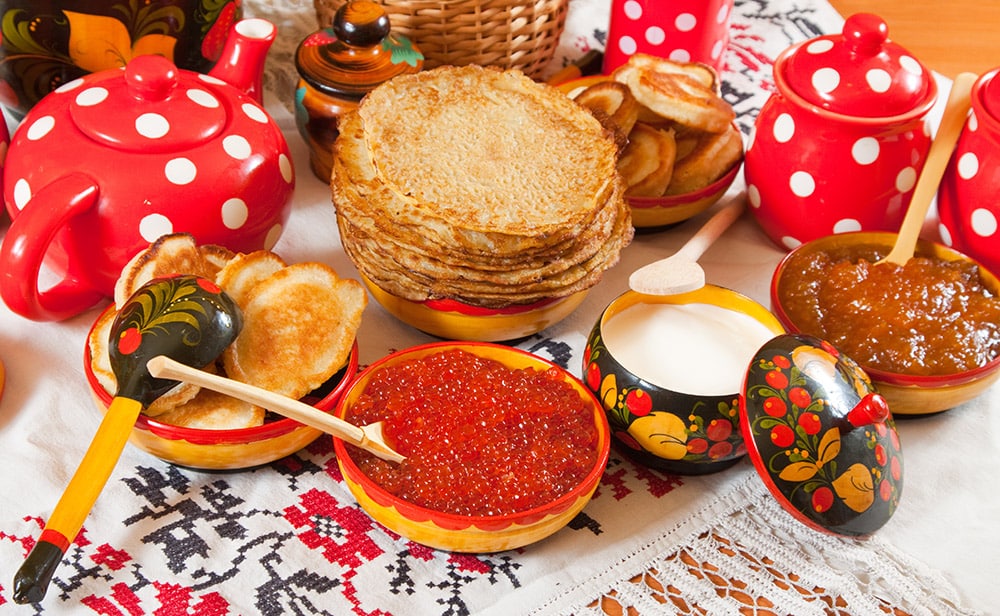
This full week of celebration is Orthodox Christianity’s version of Mardi Gras. The entymology of the name is debated. Most seem to agree that the word is taken from two Russian words: Масло (butter or oil) and “неделя” (week). This would mean that the name would translate as “butter week.” Other sources report that the name comes from a corruption of an older name: Мясопусто, which came from the words “мясо” (meat) and “пусто” (empty). Either of these make sense as it is the week in which Russians feast on eggs, butter, cheese, and milk (and abstain from meat).
The week is steeped in pagan tradition. Maslenitsa is still seen as the beginning of spring and the end of the long Russian winter, known for its severity and duration. This was a time when the ancient ancestors of the Russians worshiped a sun god, in the hopes that he would stay long and bring bountiful harvests. Bliny (блины – a kind of buttery crepe) was and is baked and eaten as a symbol of the sun. The modern Orthodox have resolved this pagan connection by claiming that the sun is a symbol of Christ, or at least his holy spirit (which is also depicted by the golden circle that always occurs behind his head in Russian Orthodox icons). Whatever their meaning, blini are tasty and are baked and eaten in large quantities. In addition, the holiday is also traditionally celebrated with music, bonfires, a stuffed “Lady Maslenitsa” (who is burned in the bonfire), and sledding and snowball fights, if there is still sufficient snow. More on Maslenitsa and blini.
Defenders of the Fatherland Day
In Russian: День Защитника Отечества
February 23, 2026
(days off: February 23, 2026)
The work day on February 22 officially ends one hour earlier than normal.
Imagine Father’s Day in military uniform and you have a rough approximation of this holiday. Since all Russian men are supposed to serve in the army (although it is possible not to serve), this day is technically the day of all men. It’s history is briefly as follows: in 1918, just after the German invasion of the USSR and capture of Minsk, the Soviets declared a state of emergency and called for a draft in St. Petersburg. Ten thousand people signed up on February 23, 1918. It is interesting to note that most Russian histories still record these people as “volunteers” (добровольцев) while Western histories prefer the harder term “draftees” (призывник). The day was first celebrated in Moscow as “Day of the Birth of the Red Army” in 1922. It was made an official holiday in 1923 under the name “Day of the Red Army.” The name changed again in 1946 to “Day of the Soviet Army and Navy.” As the Soviet Union ceased to exist in 1991, the holiday’s name was also changed to its current “Day of the Defenders of the Fatherland.” Men are congratulated, given cards, flowers, and gifts on this day.
International Women’s Day
In Russian: Международный женский день
March 8, 2026
(days off: March 9, 2026)
The work day on March 7 officially ends one hour earlier than normal.
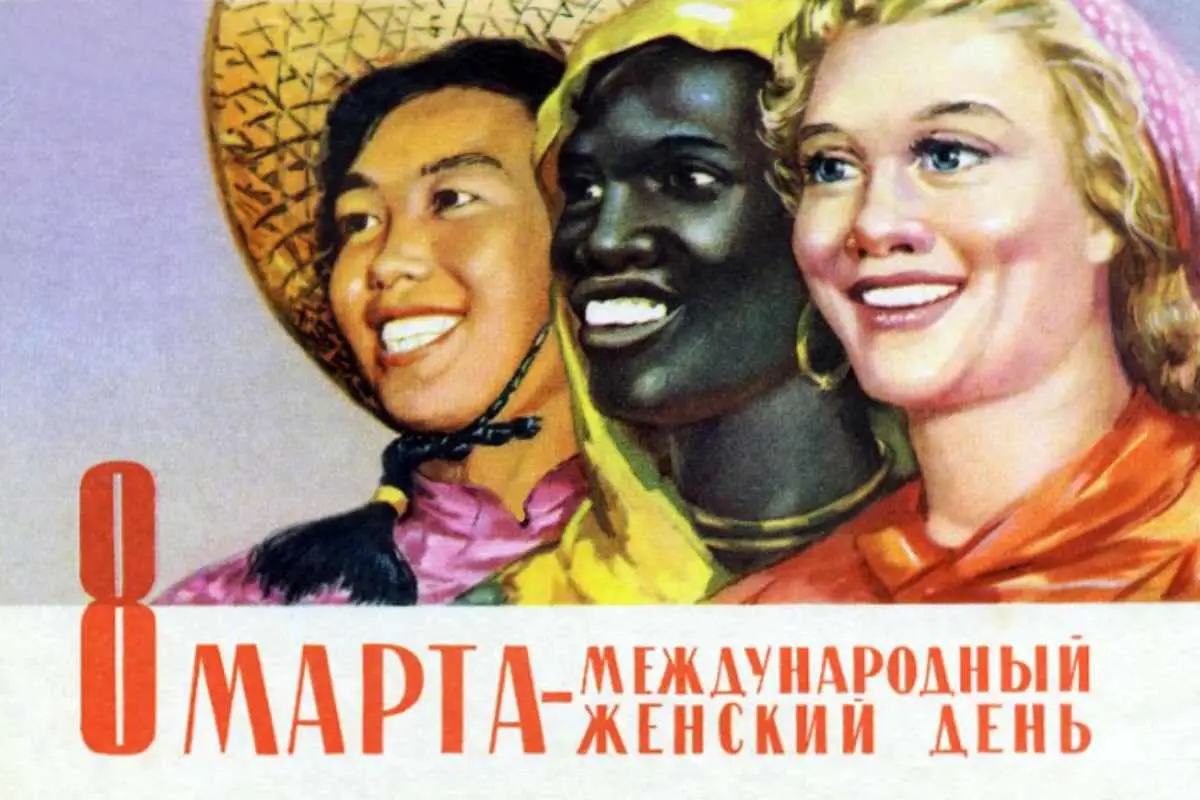
This day is similar to Mother’s Day in America, except that all women are celebrated. Be prepared with flowers and possibly candy, a card, etc. for the important women in your life. On March 8, 1917, women marched in St. Petersburg, demanding bread, better working conditions, and an end to WWI. The march became violent, but soldiers refused to shoot at the women. It was one of the moments that eventually precipitated the February revolution that would bring the Bolsheviks to power. Another effect was that, a few days later, on March 19, 40,000 women marched through St. Petersburg to demand the right to vote. They held long, but eventually successful, negotiations with the head of the provisional government that night. In 1910, during a meeting of women in the Socialist International, a proposal was made to adopt March 8th as an international socialist holiday marking the struggle for women’s rights. The International did adopt the idea, proclaiming just such a holiday, but did not assign to it any particular date, leaving that decision up to the party members from each country. The day was first celebrated in St. Petersburg in 1913, but it would not become an official state holiday and day off until 1965. Read more about its history in this Russian MiniLesson.
Orthodox Easter
In Russian: Православная Пасха
April 12, 2026
(April 12, 2026, always on a Sunday)
According to the Orthodox Church, Easter is held on the first Sunday after the date of the first full moon that occurs on or after March 21. Thus, Orthodox Easter is usually on a different day from Catholic (Western) Easter. Orthodox Easter is traditionally celebrated with church attendance, incense, and simple, traditional foods such as the kulich and, of course, boiled eggs, which are sometimes simply decorated by dying them in water boiled with onion skins or elaborately painted. People great each other with “Христос воскрес!” (Christ is risen), to which the reply is “Воистину воскрес!” (Truly risen). Church services led by the Patriarch are broadcast on national TV and public transport runs til the wee hours to accommodate the late mass. In Russia, Easter is the most popular religious holiday and one of the most popular holidays overall, even more than Christmas. Click here for much more about Easter in Russia.
The Day of Spring and Labor
In Russian: Праздник Весны и Труда
May 1, 2026
(days off: May 1, 2026)
Formerly International Worker’s Solidarity Day under the old Communist system, it seems that everyone calls this one something different now. “Labor Day,” “The May Holiday,” and “Worker’s Day” all seem to be used, but everyone at least uses the same date. It is celebrated with parades, concerts, food, and drink and traditionally kicks off the dacha season. To read about what SRAS students have seen at Labor Day celebrations, click here.
Victory Day
In Russian: День Победы
May 9, 2026
(day off: May 11, 2026)
This day celebrates the end of WWII (The Great Patriotic War, as Russians know it), in which Russia lost some 20 million people. Understandably, the Russians take this day quite seriously and it has become an important part of their identity; imagine Memorial Day and the Fourth of July in America combined to get some indication of its scope. It is celebrated by parades, concerts, fireworks, recognition of veterans (who usually dress up for the occasion) and, of course, food and drink. More recently, an “Immortal Regiment” has been organized, in which the decedents of those who fought in the war join together with pictures of the WWII veterans. It is now a worldwide tradition. As it is quite close to the May 1-2 holidays, many Russians take some extra time off to escape to their dachas for nearly two weeks so as to “open” it for the summer season. In 2009, a bill was offered by the ruling United Russia party that would have officially moved some of the extra-long New Year’s holiday to the May holiday, but the bill was voted down. For much more on Victory Day in Russia and across the Soviet space, click here.
International Children’s Day
In Russian: Международный день защиты детей
June 1, 2026
(not a day off)
This international holiday, which was founded in France originally, focuses on the rights of children. The day is marked in Russia mostly with events held in parks which focus on education and play.
Russia Day
In Russian: День России
June 12, 2026
(day off: June 12, 2026)
This holiday commemorates the adoption of the 1991 Declaration of Sovereignty of the Russian Federation which declared Russia’s “independence” from the USSR. However, many Russians are still unaware that this was ever done viewing Russia, instead, as a successor state to the USSR. In accordance with this view, this holiday is generally celebrated simply as show a of patriotism for Russia. It’s celebrated similarly to Victory Day, with fireworks set off at 10 p.m. For more on the history of this day, click here. To read about what SRAS students have seen at Russia Day celebrations, click here.
The Day of Knowledge
In Russian: День знаний
September 1, 2026
(not a day off)
The first day of school is widely celebrated as a holiday in the Russian speaking world. Besides going to school, the day is marked by giving flowers to teachers, a speech given by the director of the school to the students (at MGIMO, the remarks are given by the Minister of Foreign Affairs), and other events such as the “first bell” (первый звонок) where a first grade girl is lifted to the shoulders of an older male pupil to ring in the first school day. Note that even when this day falls on a weekend, it is generally still the first day of school due to its special holiday status.
People’s Unity Day
In Russian: День народного единства
November 4, 2026
(days off: November 4, 2026)
Russia’s absolute newest holiday, created in 2004, celebrates the liberation of Moscow from Polish troops in 1612 and the subsequent end of the “time of troubles.” This is the first time in nearly 400 years, however, that an official state holiday has marked the occasion, leading many Russians to ask why it was created. It’s very possible that when the Duma abolished November 7 (formerly Revolution Day) from the national calendar, they felt a holiday was needed in November so that people would not have to go from June to January without one. November 4 was sufficiently important. Given its proximity to the old holiday, many Russians still associate it with the communist holiday. The communists have actively boycotted the holiday and marked the seventh with demonstrations instead. In any case, the new holiday is celebrated the same as the old holiday: with political activism – only this time that activism is coming largely from the United Russia party. Read about what SRAS students have seen at official Unity Day celebrations here.
Mother’s Day
In Russian: День матери
November 29, 2026
(not a day off; Always on the last Sunday of November)
Created only in 1998, this holiday has only recently begun to take hold in Russia. It is still vastly overshadowed by the older and better-established Women’s Day. Recent boosts in observation have come largely through increased reminders on TV news reports and related events staged by NGOs and other organizations concerned with Russian demographics. It always falls on the last Sunday of November. Father’s Day does not yet exist in Russia (and if it did, would be overshadowed by Defenders of the Motherland Day).
City Day
In Russian: День города
Varies by city
Each city in Russia celebrates its official founding date with fireworks, concerts, speeches by local politicians and other figures, food, drink, and other city-specific festivities. City days are set by each city individually and some are set days while others are variable. For example, Moscow’s celebrations are always on the first Saturday of September, Irkutsk’s on the first Sunday of June, and Kiev’s on the last Sunday of May. However, St. Petersburg always celebrates on a set date (May 27).
Ex-Holidays:
The Russian Duma passed a bill on December 24, 2004 eliminating two Soviet Era holidays:
November 7. Day of Accord and Reconciliation / День Согласия и Примирения (was a day off)
The 1917 Russian Revolution occurred in October according to the Julian calendar. Although the Russians quickly changed the calendar, the name “October Revolution” stuck, despite the fact that it occurred on Nov 7th according to the new, Gregorian calendar. After the fall of the Soviet Union, the name of the day was changed from “The Day of the Great Revolution of October 1917,” and its official purpose changed to celebrate the unity of Russia. However, in a poll some 50% of Russians stated that they didn’t know why they celebrate the day. Some said that they celebrate it to celebrate not having to celebrate the Revolution anymore! Given the fact that the “Day of Accord and Reconciliation” was so short-lived, perhaps that was its actual purpose, in retrospect.
December 12. Constitution Day / День Конституции (was a day off)
The date of this holiday changed several times over the course of history, with each new Soviet/Russian constitution from Lenin to Stalin to Brezhnev to Yeltsin. Celebrated with fireworks, food, and drink.
You’ll Also Love
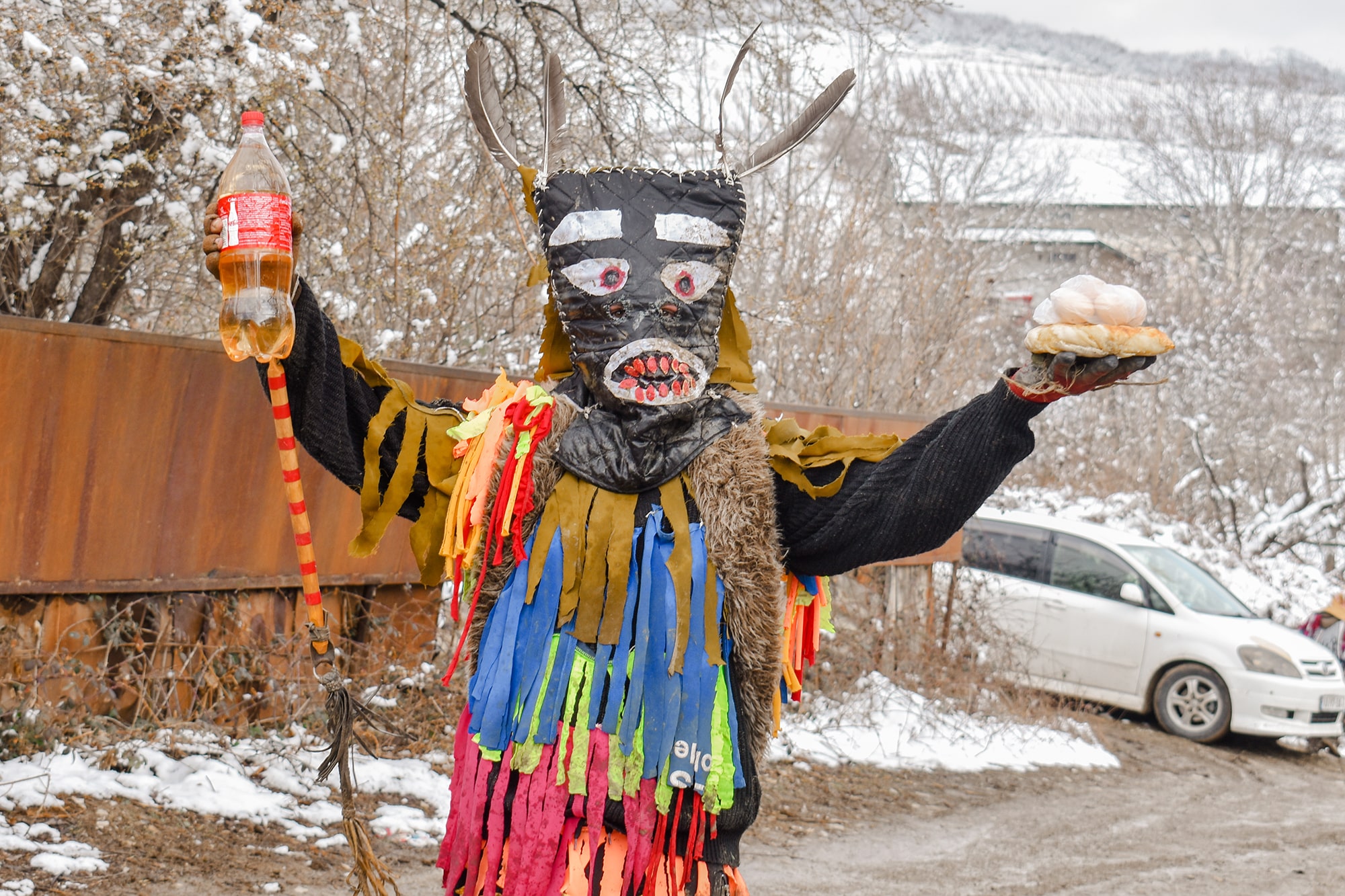
Berikaoba: Georgia’s Spring Festival Rises Again
Berikaoba is defined by its monstrous-looking masks, good-natured pranking, games and performances of strength, freely shared food and wine, and general festive atmosphere. Although the festival was nearly lost to the passage of time, locals, foreigners, and Georgians from other corners of the country now flock to the Kakhetian villages of Didi Chailuri and Patara […]

Ramadan and Eid in Bishkek, Kyrgyzstan
Ramadan is the Muslim holy month when followers are expected to fast, not drinking or eating from sunrise to sunset. During this month, daily life is molded around the fast. Ramadan ends with Eid al-Fitr, a feast and celebration. Kyrgyzstan is a majority Muslim nation and Ramadan and Eid al-Fitr are major parts of the […]
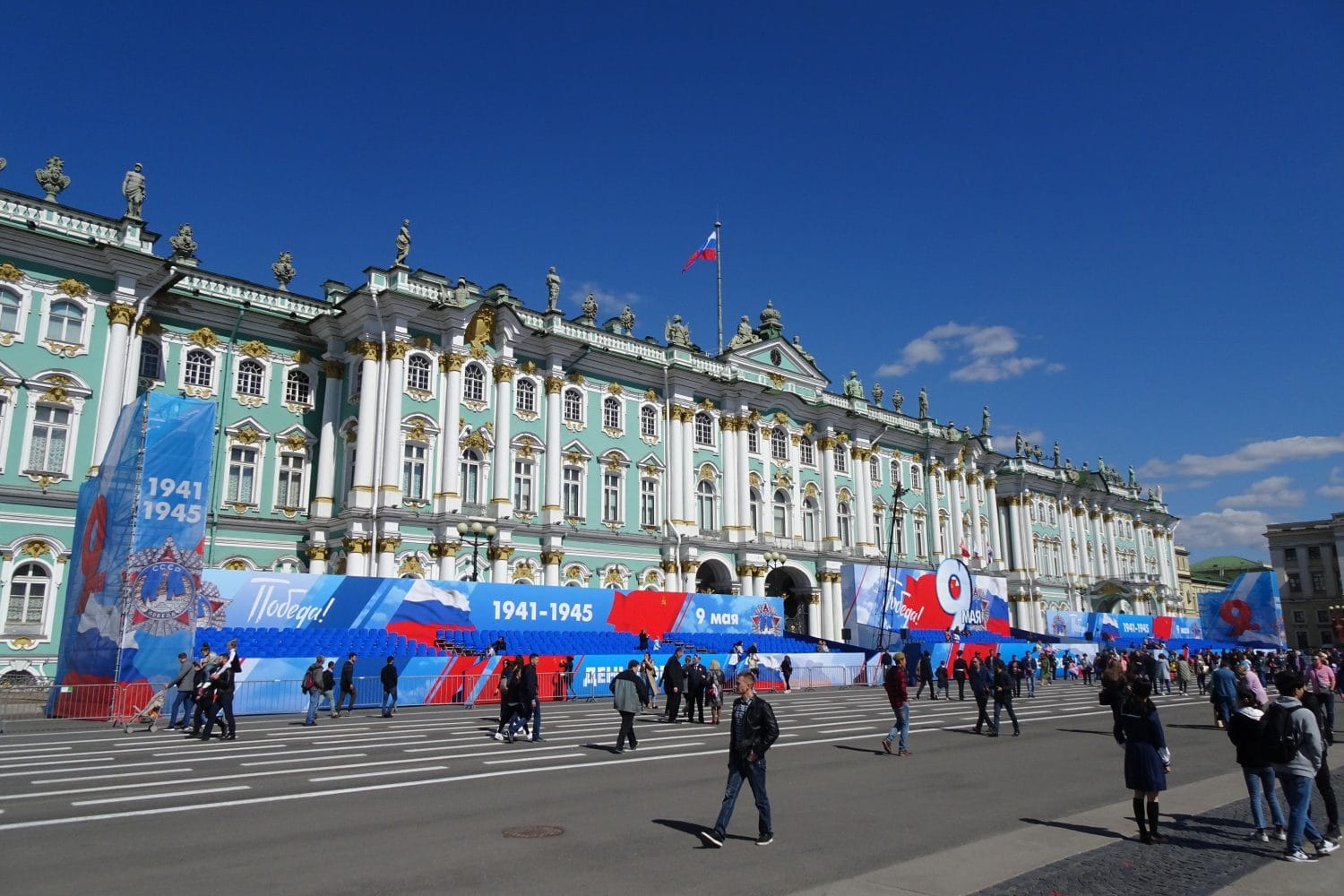
Remembrance of WWII and Russian Identity: Student Observations
World War II holds profound significance in modern Russian culture, transcending mere historical events to become a deeply ingrained element of national identity and collective memory. Known as the Great Patriotic War in Russia, it represents a pivotal period of sacrifice, resilience, and victory against Nazi Germany, shaping the ethos of the nation. Victory Day, […]
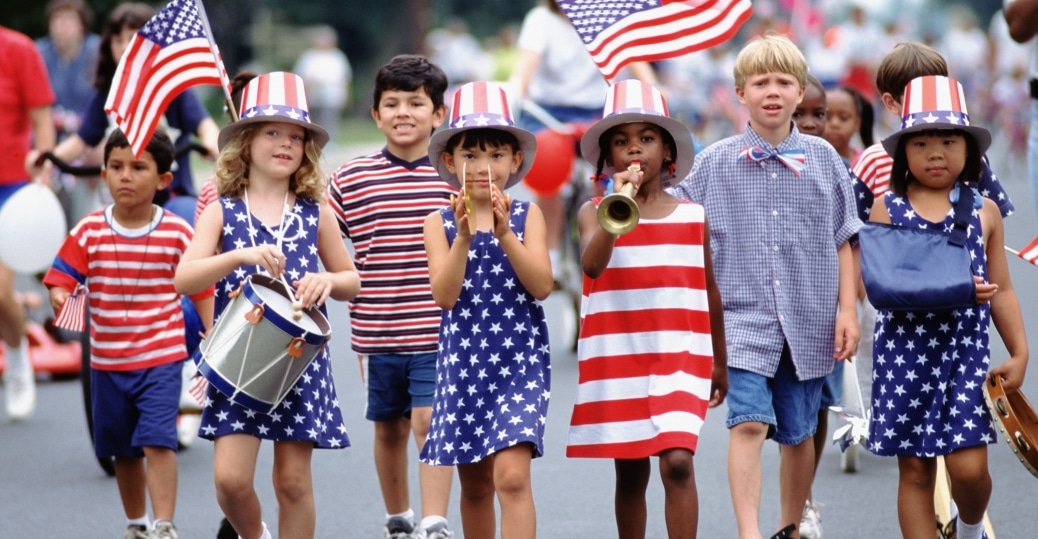
Russian MiniLesson: День независимости США – America’s Independence Day
The following bilingual Russian MiniLesson is meant to build your vocabulary by providing Russian phrases within English text. Hover over the bold Russian to reveal its English translation. It is written for those students who may be interested in discussing with Russian friends the meaning and history of one of America’s most important holidays. is […]
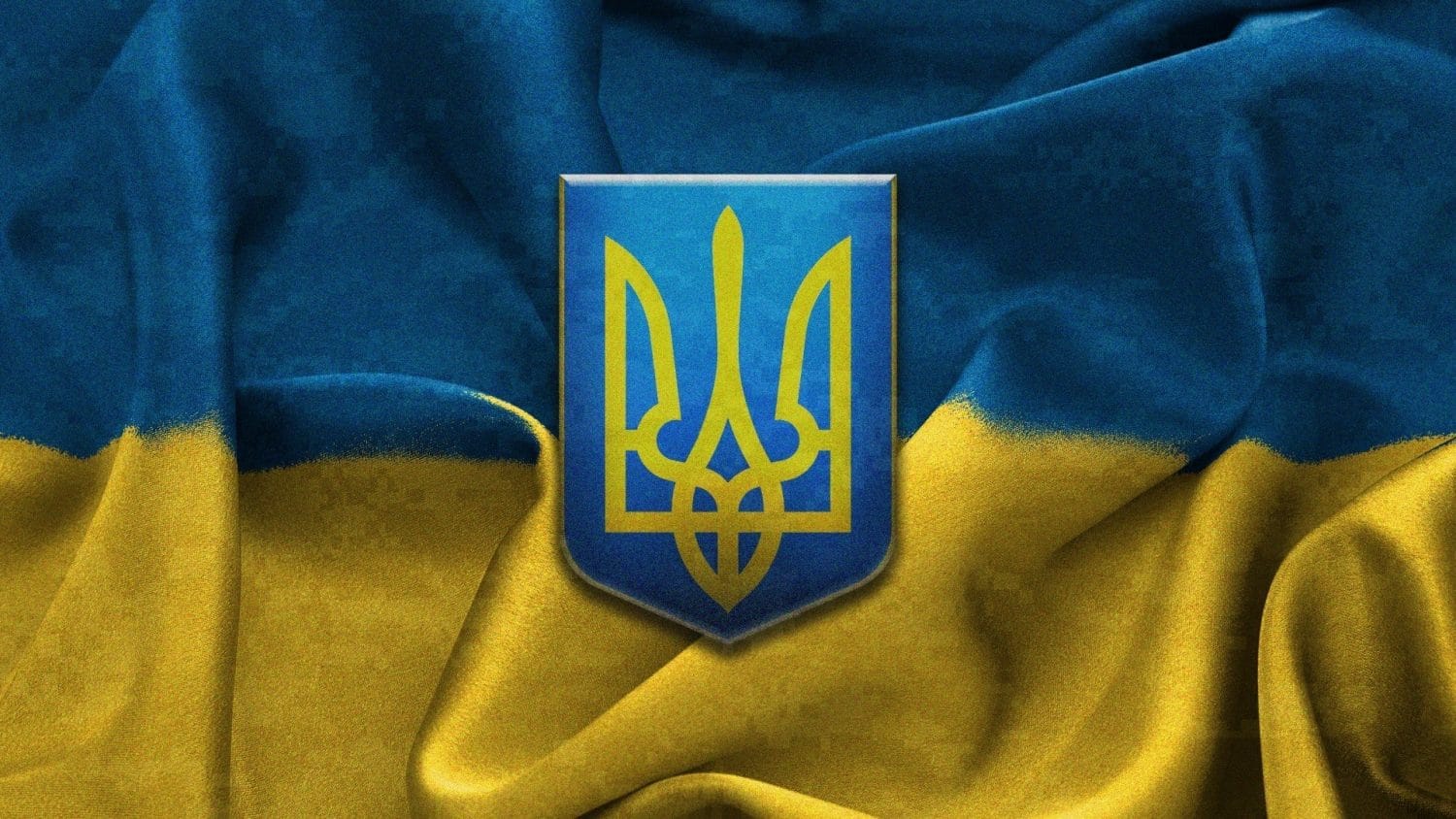
Ukraine Constitution Day: Student Observations
Constitution Day in Ukraine is celebrated on June 28th. Celebrated since 1996, this day commemorates the anniversary of the approval by the Verkhovna Rada (Ukraine’s parliament) of the Constitution of Ukraine. Before 2014 and the Revolution of Dignity in 2014, the holiday’s importance and observance were minimal and around 10% of Ukrainians believed it should […]

